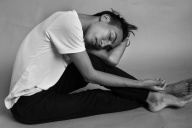Hong Khaou, director and writer of the indie film hit ‘Lilting’ talks to & Of Other Things
Set in an atmospherically dreary London, ‘Lilting’ tells the story of Richard, whose boyfriend Kai has died, and Richard’s attempts to connect with Junn, Kai’s Chinese-Cambodian mother. Not only does Junn not speak any English, she also doesn’t know that her son was gay. Communicating through a translator the two grieving people have to navigate many differences. A nuanced and beautiful film, with lead roles played by Ben Whishaw (Cloud Atlas, Perfume) and Pei-Pei Cheng (Crouching Tiger, Hidden Dragon), Hong Khaou’s first feature film had indie film critics doling out well deserved praise, catapulting it to wider attention.
Hong Khaou now lives in London but was born in Cambodia. Having been displaced by Pol Pot’s Red Khmer in 1975, spending his childhood years just outside of Ho Chi Minh City and being bilingual means that ‘Lilting’ has more than one story line rooted in the director’s personal experience. & Of Other Things talked to him about things lost in translation, the potpourri of his national identities that make answering the question “where are you from” a complex one and about his next film which is set in Vietnam.
Interview by Fabiola Büchele ● Photos by John Griffin
&: What themes do you identify with in the film?
Hong Khaou: The big themes are communication, and it’s about grief and intergenerational, intercultural things. Out of that you have these other smaller themes, memory and love as well.
I guess the premise of it was really the mother character and, because she can’t speak English, how a woman like that copes in a foreign world when her lifeline to that world is gone.
There is the character of a translator so I avoided subtitling. There are a few scenes with subtitles but the bulk of the film is via translator, as a writer that presents itself as a really interesting premise. You can talk about miscommunication…I use the character of the translator to interfere and make scenes that are more awkward.
We know that language and communication should bridge cultural differences, should bring about understanding. But I wanted to present the two sides of the coin, because ultimately it also highlights differences that are so rooted in us that you have conflict coming out of it.
&: You yourself are bilingual and your mother doesn’t speak English, are there things you simply can’t express in one language or the other?
Hong Khaou: Yes absolutely. It is very hard to translate things that happen in my life back to my mother because I don’t have the range of vocabulary in Chinese. I think my Chinese is getting worse and worse. Especially when I take my mum to the doctors and they talk about certain things like arteries and stuff, it’s very hard to translate that to her. I remember watching myself and almost reducing myself to baby talk, to demonstrate to her what I was trying to say.
&: The central character in your movie is a gay man. Yet the original play that proceeded the film featured a heterosexual couple. Why the change?
Hong Khaou: In the readings of the play – it never got staged – I always felt it lacked something. And for a long time I was thinking about, what I could do to make it a bit richer. When it was time to write this for the [Film London] Microwave competition I decided to give it a go. And I think what it does, it presents a really interesting dynamic and it added a deeper layer into the story. The son wasn’t able to tell the mother, wasn’t able to come out to the mother and that secret is then passed on to the character of Richard. And it’s such a sensitive thing, because it almost felt like his character was having to come out a second time. But having to be really sensitive and delicate about the situation because on the one hand he doesn’t feel it’s his place to do it, but yet when the lover was alive he was constantly telling him to do it.
It’s odd, because I don’t think the film is about coming out, it’s not about that subject, but I think because he wasn’t able to be open about his sexuality a lot of events stem out of that.
&: Lilting was a few years in the making, so it must have been quite a journey. Are there moments when you felt like it was never going to be made?
Hong Khaou: There always seems to be something…. I guess that’s the nature of the film industry, I mean I am not an expert on it but it seems like it goes through these different stages, you get these kind of highs and then these lows and then these highs again. I’m a pessimist I think. The financing was really hard to get together, there was a point it felt like we might not get it together. I had many sleepless nights.
It’s odd, we look at it now and we think back to what it was like when we shot it two years ago. It’s such a low budget you could never possibly imagine it being in 30 cinemas.
&: What would you have done differently had you had a bigger budget? Is there a certain creativity found in financial restraint or is that too romantic a perspective?
Hong Khaou: It’s an interesting point. I always wish I had more days to film this. We shot it in 17 days. Like you said, because of the kind of restriction, the small nature of the budget, we were able to get a lot of really good equipment and really talented people working for us for really next to nothing.
We shot it in the winter time so it was cold, there was less daylight. If I had more days [I could have] explored certain tones and gradations and permutations of the story.
I’m not sure what else money would have brought us. It would have allowed us to eat a bit better maybe. That kind of thing. Good food can really help you, a low budget shoot is so stressful and kind of chaotic. When you’re fed well it goes a long way.
&: What is your next film project about?
Hong Khaou: Well I’ve always had a bit of an obsession with Vietnam War [American War] films. It’s very odd, it’s almost become a genre in itself. It’s very much an American centric genre. I grew up watching a lot of those films and because of my childhood memories of Vietnam I tend to pay attention to them.
I want to approach it differently. I thought it would be smarter to do a present day film where you have three characters who are products of the war, but haven’t experienced it directly. The prominent premise of it is about the repercussions of the [American] War and how this kind of hopeless war takes a lot of victims on all sides. You have this American man whose father fought in the war and he goes to Vietnam to learn about his dad’s past, a British Vietnamese man, whose family was displaced by the war and so grew up in England. He is very much westernised and returns to Vietnam to scatter his mum’s ashes and find his cultural roots. And then you have a Vietnamese girl who works on a small family owned tea plantation, who doesn’t want to continue the family business, idolises the west and wants to find a way to go there, because she thinks that’s where the opportunities are.
All my childhood memories are of Vietnam and yet I’m not Vietnamese, so it’s very odd. This film talks about that, the struggle for a sense of self, a sense of national cultural identity and the idiosyncratic ways in which we try to validate that.
&: What is your own cultural national identity?
Hong Khaou: Oh God, I don’t know. It’s a bit fucked up I think. I don’t know what it is. Somedays I think I’m Cambodian-Chinese, some days I… it’s weird because I do struggle with this. I mean it’s hard for me to say I’m Chinese, because even though we speak Chinese we have no relation to China. But of course our cultural roots are from there in some strange ways. I don’t know. I don’t really have an answer. Maybe it’s easiest for me to say I’m a Londoner, because I can be all of those and none of those.
&: Is this just a global trend? Will it become arbitrary to identify ourselves in accordance with culture and nation?
Hong Khaou: Yes, maybe it’s actually ok to not have such a solid, tangible answer. It’s actually fine in itself.





















